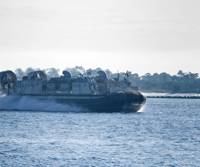USS FORD on Alternative Fuel Blend
USS Ford Conducts Operational Transit on Alternative Fuel Blend. USS Ford (FFG 54) successfully transited from the ship's homeport in Everett, Wash., to San Diego, March 2, using 25,000 gallons of a 50/50 algae-derived, hydro-processed algal oil and petroleum F-76 blend in the ships LM 2500 gas turbines. USS Ford's transit on the algal blend marks the first demonstration of the alternative fuel blend in an operational fleet ship. "We've done basically every range of research vessel we could test: the experimental riverine command boat; the Naval Academy's yard patrol; a landing craft utility, a landing craft air cushion amphibious, and self defense test ship," said Richard Leung, Naval Sea Systems Command (NAVSEA) Navy Fuels engineering manager.
LCAC 91 Achieves High Speed on Algal Blend

The U.S. Navy successfully concluded its final alternative fuel demonstration for the year today with the Dec. 7-9 operational tests of the 50/50 algae-derived, hydro-processed algal oil and petroleum F-76 blend in a Landing Craft, Air Cushion (LCAC) amphibious transport vehicle at Naval Surface Warfare Center Panama City. The tests also marked the fastest speed achieved to date by a U.S. Navy surface craft using alternative fuel blends, as LCAC 91 reached speeds the crafts maximum speed of 50 knots, Dec.
Naval Academy Training Craft Runs on Biofuel
The Naval Academy's Waterfront Readiness Department refueled yard patrol (YP) craft 692 with a biofuel blend Sept. 15 at Naval Support Activity Annapolis, demonstrating the academy's commitment to the Navy's energy goals. The fuel is a 50/50 blend of petroleum and a renewable algae-based biofuel, HRD-76. Last month, Secretary of the Navy Ray Mabus announced the Navy's latest initiative to partner with federal and private organizations in creating a sustainable U.S.-based alternative energy source, citing energy independence as necessary to national security. Richard Leung, an engineer with Naval Sea Systems Command who accompanied the shipment of 4,000 gallons of biofuel to Annapolis, also emphasized the need for alternative energy.






